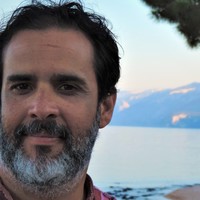
Dexter Story
Dexter Story is a multi-instrumentalist, composer, music producer and musicologist from South Los Angeles, CA. He has worked in multiple facets of the music industry, from marketing at Priority and Def Jam Records to talent buyer at the legendary LA venue Temple Bar. With an M.A. in African Studies and two recent northeast Africa-influenced albums Wondem and Bahir released on the UK-based Soundway record label, Story is currently a Eugene V. Cota-Robles and Jacqueline DjeDje fellow in the ethnomusicology Ph.D. graduate program at University of California, Los Angeles. His research focuses on the traditional music of the African Red Sea, particularly in the enigmatic country of Eritrea. Story is a staunch believer that his doctoral research, his derivative recordings, and background uniquely center northeast African musical practice and provide opportunities for intersectional affinities and collaborations within the global Black music diaspora.
A film and TV composer, Story recently scored the music for the PBS series 10 Days in Watts, a tribute to Watts activist Ted Watkins directed by Raphael Sbarge, in addition to the Lions Gate horror comedy The Blackening directed by his younger brother Tim Story. Also, his recent concert at Los Angeles’ popular outdoor venue Grand Performances opened for Gambian favorite Sona Jobarteh and featured a Los Angeles-based Nubian music ensemble. For the past nine years, he has also been an artist-in-residence and production consultant with South Los Angeles’ Community Coalition, a community organizing and advocacy non-profit founded by Los Angeles mayor Karen Bass. He is based in Los Angeles with his wife but spends a large portion of the year in the Horn of Africa.
Supervisors: Advisor: Dr. Cheryl Keyes (UCLA Ethnomusicology | African American Studies)
Address: P.O. Box 447
South Pasadena, CA 91030
A film and TV composer, Story recently scored the music for the PBS series 10 Days in Watts, a tribute to Watts activist Ted Watkins directed by Raphael Sbarge, in addition to the Lions Gate horror comedy The Blackening directed by his younger brother Tim Story. Also, his recent concert at Los Angeles’ popular outdoor venue Grand Performances opened for Gambian favorite Sona Jobarteh and featured a Los Angeles-based Nubian music ensemble. For the past nine years, he has also been an artist-in-residence and production consultant with South Los Angeles’ Community Coalition, a community organizing and advocacy non-profit founded by Los Angeles mayor Karen Bass. He is based in Los Angeles with his wife but spends a large portion of the year in the Horn of Africa.
Supervisors: Advisor: Dr. Cheryl Keyes (UCLA Ethnomusicology | African American Studies)
Address: P.O. Box 447
South Pasadena, CA 91030
less
Related Authors
Michael Birenbaum Quintero
Boston University
Jocelyne Guilbault
University of California, Berkeley
Emiel Martens
University of Amsterdam
Maarten Manmohan
The University of Trinidad and Tobago
Carlo Cubero
Tallinn University
Martin Raymond
The University of Trinidad and Tobago
Timothy Rommen
University of Pennsylvania
Gugolati Maica
Institut des Mondes Africains (IMAF)
Laila Shah
King's College London
InterestsView All (23)










Uploads
Papers by Dexter Story
The present essay surveys the written representation and analysis of cultural data in the ethno/musicological domain. Ethnomusicology— intermittently coined in the mid-twentieth century Musikologie, comparative musicology, and then the hyphenated ethno-musicology—has a long history of transcriptive methods, which have evolved over the last two centuries from basic human aural perception to automated technologies and tools (Nettl 2015). Transcription, in keeping with Merriam’s bold assertion about ethnomusicology quoted above, also generates self-referencing interrogation within the field. Raising more questions than it answers, this study will examine a sampling of discursive meditations on this methodology starting with the folk song transcriptions by composer Bartók, working our way through key writings by ethnomusicologists Charles Seeger on the “prescriptive” and “descriptive,” George List on the use of comparative methods, Nicholas M. England on the Hukwe Bow exercise at the annual Society for Ethnomusicology conference in 1963, and Nazir Ali Jairazbhoy on “objective” and subjective views. It will additionally cover Tara Browner and her breakthrough explorations notating the pow-wow, the issue of African transcription through the works of J. Kwabena Nketia, V. Kofi Agawu, Kay Kaufman Shelemay, Jacqueline DjeDje, Simha Arom, and John Blacking, and lastly Jason Stanyek and his recent round table convening on the topic. The paper will also briefly acknowledge new discourses on analytic innovations and ethical concerns. Collectively, these studies inquire into how transcription has played a critical role for the field, both methodologically and discursively, raising more questions than they answer for this essay. Is there anything new to say or unconceal regarding the musicological exercise of transcribing and analyzing sound? How might we re-explore and reframe notational practices? Have the practices altered or transformed in the last quarter century and how? And what does the historical trajectory teach us about our fieldwork, about our discipline and, perhaps, about ourselves? Through a close examining of these selected chronological readings, it is hoped that enlightened perspectives can arise from the “sea of terminologies” (Meyers 1992:10).
Book Reviews by Dexter Story
The present essay surveys the written representation and analysis of cultural data in the ethno/musicological domain. Ethnomusicology— intermittently coined in the mid-twentieth century Musikologie, comparative musicology, and then the hyphenated ethno-musicology—has a long history of transcriptive methods, which have evolved over the last two centuries from basic human aural perception to automated technologies and tools (Nettl 2015). Transcription, in keeping with Merriam’s bold assertion about ethnomusicology quoted above, also generates self-referencing interrogation within the field. Raising more questions than it answers, this study will examine a sampling of discursive meditations on this methodology starting with the folk song transcriptions by composer Bartók, working our way through key writings by ethnomusicologists Charles Seeger on the “prescriptive” and “descriptive,” George List on the use of comparative methods, Nicholas M. England on the Hukwe Bow exercise at the annual Society for Ethnomusicology conference in 1963, and Nazir Ali Jairazbhoy on “objective” and subjective views. It will additionally cover Tara Browner and her breakthrough explorations notating the pow-wow, the issue of African transcription through the works of J. Kwabena Nketia, V. Kofi Agawu, Kay Kaufman Shelemay, Jacqueline DjeDje, Simha Arom, and John Blacking, and lastly Jason Stanyek and his recent round table convening on the topic. The paper will also briefly acknowledge new discourses on analytic innovations and ethical concerns. Collectively, these studies inquire into how transcription has played a critical role for the field, both methodologically and discursively, raising more questions than they answer for this essay. Is there anything new to say or unconceal regarding the musicological exercise of transcribing and analyzing sound? How might we re-explore and reframe notational practices? Have the practices altered or transformed in the last quarter century and how? And what does the historical trajectory teach us about our fieldwork, about our discipline and, perhaps, about ourselves? Through a close examining of these selected chronological readings, it is hoped that enlightened perspectives can arise from the “sea of terminologies” (Meyers 1992:10).